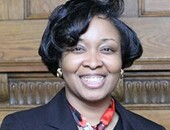'Big George Foreman' Is a Poignant Testimony of the Boxer's Journey of Faith
Dr. Jessica A. Johnson
"Nothing ever came easy. Every day was a fight."
This quote is part of the opening narration in the film "Big George Foreman," as the former heavyweight champion tells his inspirational life story that began with growing up in acute poverty in the Fifth Ward of Houston, Texas, during the early 1960s. Foreman's mother, Nancy (Sonja Sohn), struggled to feed and provide for him and his four siblings while earning a meager salary as a waitress. In a touching scene, Nancy comes home from work, unwraps a hamburger, and then breaks it in pieces to feed her children. She humbly prays over this meal, even though it is sparse. Foreman, who was only 10 at the time, gobbles down his portion and goes to bed still hungry. His mother makes him promise not to fight at his new school the next day, but fighting was the only thing Foreman believed he was good at. Foreman bottled up his rage in his fists, and he was on a dangerous course. He dropped out of school and got involved in street crime. Being fortunate in not getting caught for an attempted mugging, Foreman decides to join the Job Corps and later earns his GED.
One prominent theme early in the film that stood out to me was Foreman battling an identity crisis as a young man, which was the source of his rage and compellingly portrayed by Khris Davis. Foreman was angry that his poverty made him invisible due to people completely disregarding his presence. He was angry at the adverse circumstances his mother faced, and he was perplexed by her unwavering faith in God. So, of course he was angry with God because he felt God never showed up for him. But Foreman didn't understand that his mother was praying for the Lord to order his steps with grace.
Doors were about to open for Foreman, but there were still some rough times ahead. When Foreman was introduced to boxing by Doc Broadus (Forest Whitaker), a Job Corps administrator, it was the perfect sport to teach Foreman discipline while utilizing his physical strength. He beat the training odds and represented the U.S. in boxing in the controversial 1968 Olympic Games in Mexico City, winning a gold medal after defeating the Soviet Union's Ionas Chepulis. Here again, Foreman faced an identity crisis when he did not protest against American racism and prejudice as Black sprinters John Carlos and Tommie Smith did. Foreman proudly paraded around the ring with a small American flag, and he faced harsh backlash from his friends when he returned home.
From studying the era when Foreman turned pro, I've always felt that he was overshadowed by the other prominent heavyweights during the prime of his career, and the film precisely depicts how Foreman, although successful by the early 1970s, still had a huge chip on his shoulder. His 1973 upset of Smokin' Joe Frazier to win the heavyweight title shocked the boxing world in a similar way that Muhammad Ali's defeat of Sonny Liston did in 1964. Ali set out to reclaim the heavyweight crown that was taken from him due to his refusal to be drafted for the Vietnam War. When Ali beat Foreman in the epic 1974 Rumble in the Jungle held in Kinshasa, Zaire (now the Democratic Republic of the Congo), Foreman was humiliated, but he had a life-transforming experience three years later that would take him from the ring to the pulpit.
Foreman's encounter with God after collapsing in his dressing room when he lost to Jimmy Young is a well-known part of his life's testimony. People were amazed that he left boxing and turned down millions to preach the Gospel. What they didn't comprehend was that Foreman was turning his back on what 2 Corinthians 5:17 identifies as the "old man" to become "a new creature" in Christ. For Foreman, the old man was incensed and full of resentment due to how people viewed him. He now had spiritual peace with a new purpose. He only returned to the ring to save the church and youth center he established after a friend's betrayal nearly brought him to financial ruin. Foreman would shock boxing fans again when he became the oldest heavyweight champion at age 45 in 1994, after he defeated Michael Moorer.
Foreman said that he fought because he felt "hated by the world," but as "Big George Foreman" beautifully shows, he came to realize that everything he was searching for was already within him. I'd say it took a knockout by God to place him on his destined path.
Dr. Jessica A. Johnson is a lecturer in the English department at Ohio State University's Lima campus. Email her at smojc.jj@gmail.com. Follow her on Twitter: @JjSmojc.
Photo by Prateek Katyal on Unsplash




You must be logged in to post stack comments. Please Login or Signup (free).